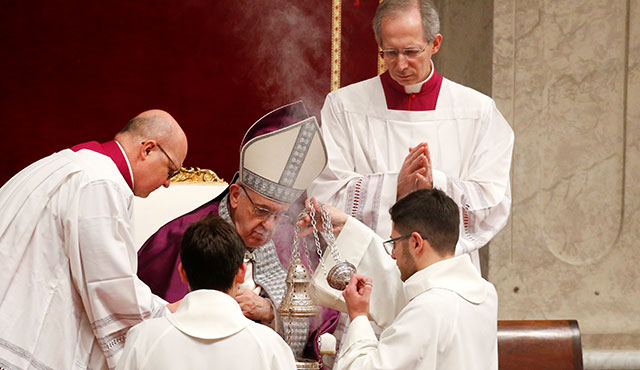Benjamin Franklin famously appropriated the quote that two things were certain: death and taxes.
As Catholics prepared to enter into the Lenten season this year, Pope Francis talked about the importance of reflecting on the inevitably of our own death in his homily at Casa Santa Marta on Feb. 1. Once we come to grips with that certainty and learn to accept, rather than fear death, he says, it frees us to live more fully and follow closer to God’s wishes.
It is a message that resonates with Father Christopher Smith, rector at Christ Cathedral in Garden Grove. “Life is the doorway for full-life, so it matters what we do here,” Father Christopher said. “We can’t just wait for the prize. And that’s what Francis is so eager for us to learn.”
Although Lent is about the preparation for Jesus’ death and the resurrection and victory to follow, Francis said we have to realize that death comes first, for everyone and without exception. As Jesus had to accept and even embrace his journey to the cross, so too we are called upon to understand that our mortal time, short or long, is finite. Without death there is no infinite.
As we reflect on death and what comes after, Francis said we should ask ourselves: “What would be my legacy if God were to call me today? What legacy would I leave as a testimony of my life?”
The pontiff continued: “It is a good question to ask ourselves. And thus, we can prepare ourselves, because each one of us… none of us will remain ‘as a relic.’ We must all go down this path.”
Father Christopher said Pope Francis’ message has particular import at this time of year. “In Lent we prepare for death and resurrection, when the Lord changed death from an ending to a beginning.” Many Catholics understand that death is not something to fear, but is still hard to accept. It is just a step in the Catholic journey.”
“Death is a fact that affects everyone,” the pope said. As a result, he said, we need to pray to God asking for a good sense of time, so that we are not “imprisoned” by the present moment. He also recommended repeating to yourself the phrase: “I am not the master of time.”
Another point the pope was making, is that when we think of death it is important to reflect on how we will get there and how we will use whatever time God grants. We should be “using our lives as God intended,” Father Christopher said, and “build a life with hope, not with guilt and shame.”
Father Christopher says we are called to put reflection into action. “It doesn’t happen by accident,” he said. “It has to be on purpose, that we do things to leave the world a better place.”
Remembering that we are all on the path to death, Francis said, “will make us treat everyone well.”
“The whole idea of redemption is to bring good out of things that only look like death and suffering,” Father Christopher said.
The pope’s homily was inspired by the death of King David and his advice to his son Solomon in the first Book of Kings. David tells his son, “Keep the mandate of the Lord, your God, following his ways and observing his statutes, commands, ordinances, and decrees as they are written in the law of Moses, that you may succeed in whatever you do, wherever you turn.”
It is a prescription for a life well lived.
Leonardo da Vinci wrote that one “whose heart is firm, and whose conscience approves their conduct, will pursue their principles unto death.”
Father Christopher said Francis had done this by working with refugees and victims of oppression and other horrors. “Right here and now we’re to work to end evil so people can flourish,” Father Christopher said, and “bring life where there is only death.”
By accepting and reflecting on our inevitable death with acceptance, we are better prepared for what’s next. As Father Christopher puts it, “The whole point is: death doesn’t win. The whole point is: life wins.”

